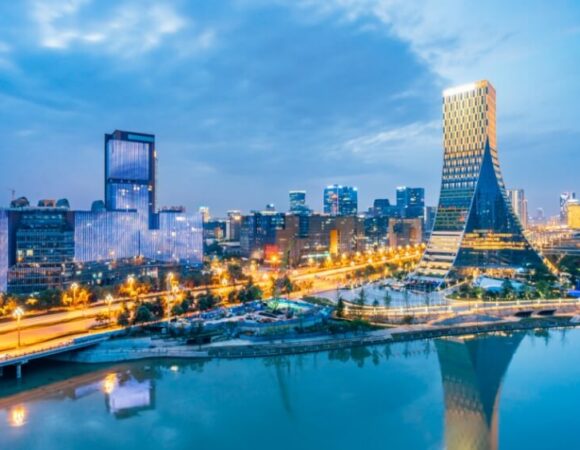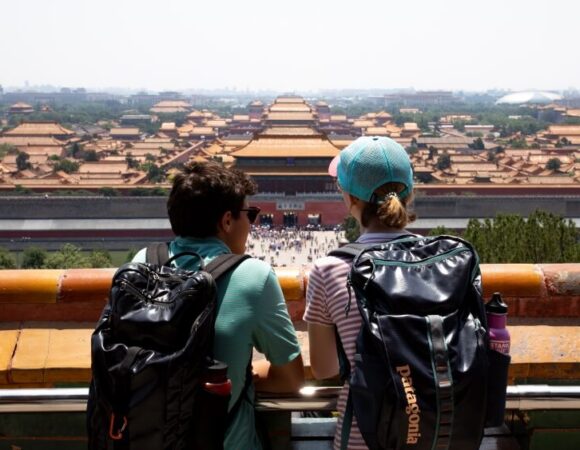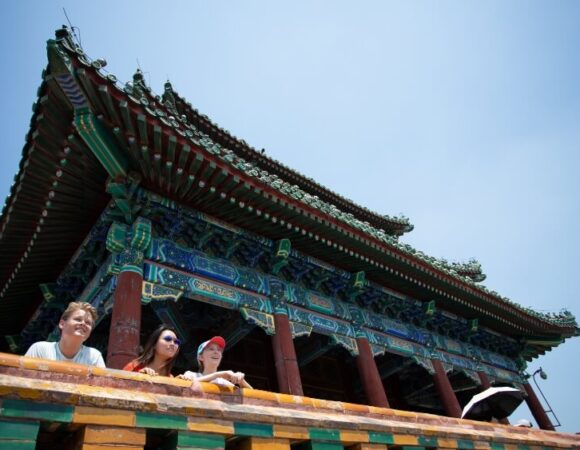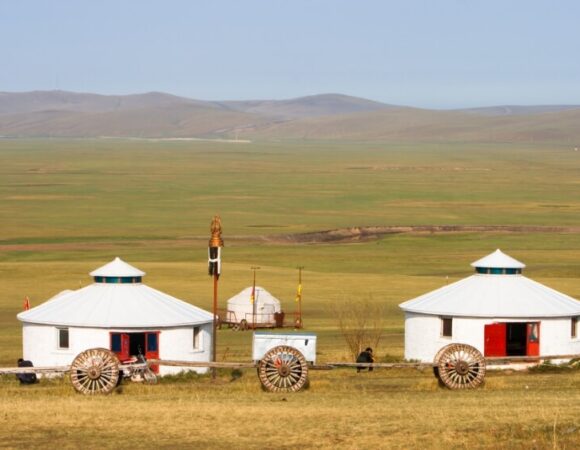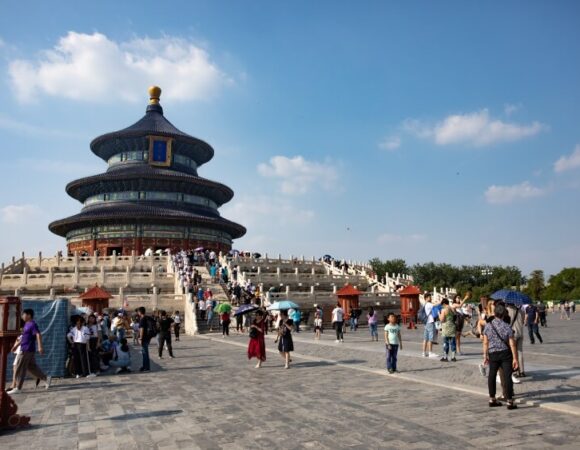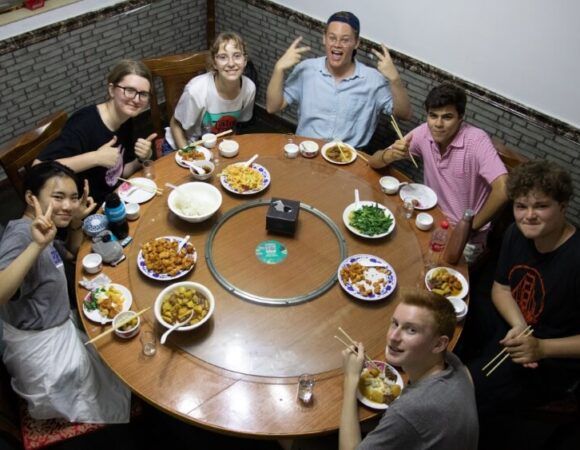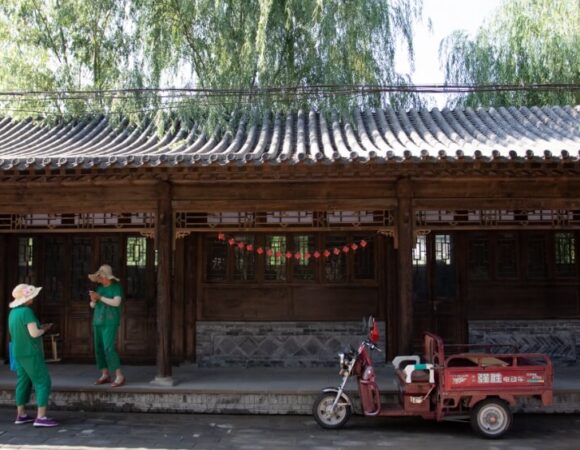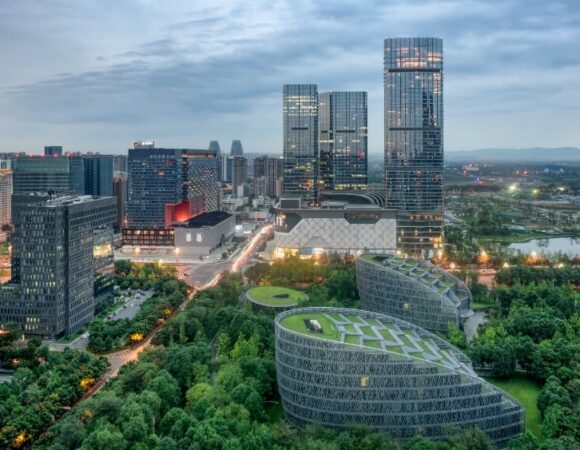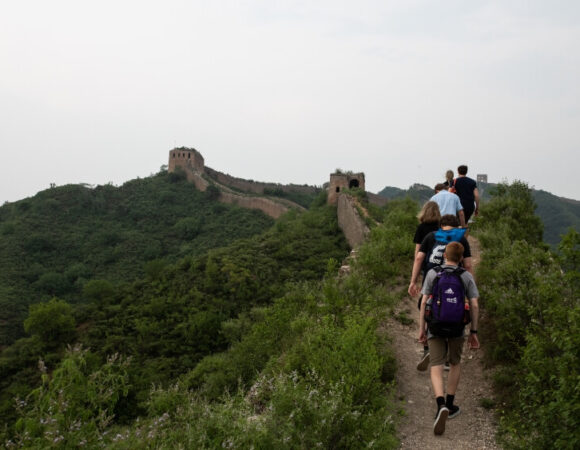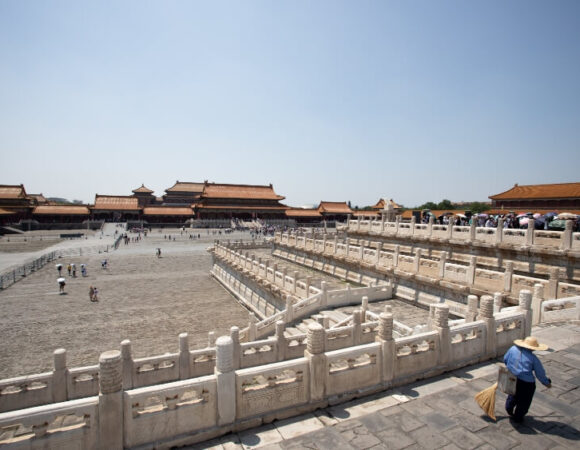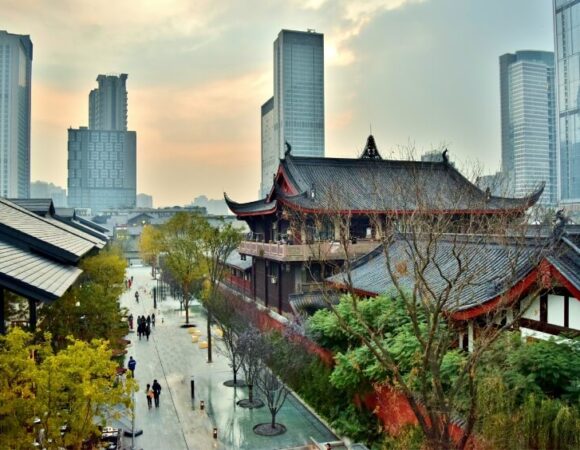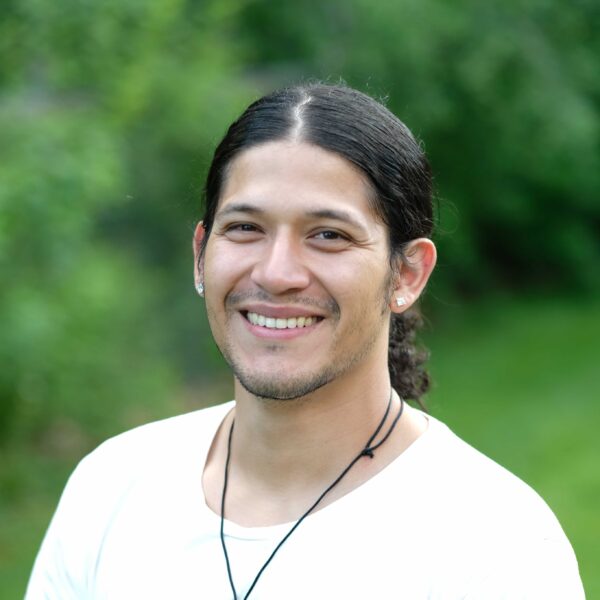Travel abroad to China this summer and immerse yourself in the Mandarin language and culture of China. On this language program for high school students, take Mandarin classes in Beijing and explore the historic hutong neighborhoods. Enjoy a one-week homestay with a family in Chengde, camp alongside herders on the Inner Mongolian steppe, and take part in workshops with Chengdu’s avant-garde artists. Sample the Sichuan Province’s renowned cuisine and end your program in the diverse metropolis of Shanghai.
- Highlights
• Spend a week living with a Chinese family in Chengde
• Ride horses and sleep in yurts on the Mongolian steppe
• Explore the diversity of Chinese cuisine, tasting dishes from over six regions
Itinerary
This itinerary represents our best projection of the group’s schedule. However, we may implement changes designed to improve the quality of the program.
inside editor:
Meet your fellow high school student travelers and one or more of your leaders in Los Angeles, and fly together to Beijing, China. To learn more about how we organize travel, click here.
Explore Beijing’s ancient hutong alleyways and modern skyscrapers. Venture out into the city on foot to take in Beijing’s history, from its founding by Kublai Khan 800 years ago to its role as host of the 2008 Olympics. Each morning, take Chinese classes and during afternoons use your Mandarin to connect with Beijingers in different parts of the city. Study calligraphy or learn how to cook classic Beijing dishes. See an acrobatic show or listen to musicians play traditional tunes in the city’s numerous parks.
Drive three hours north to the historic city of Chengde. Join a host family for one week and practice your Mandarin as you immerse yourself in daily life. Climb the Great Wall at nearby Jinshanling. Spend mornings taking Mandarin classes and afternoons exploring Chengde’s temples and parks alongside local high schoolers. Learn all about the culture of the Manchus, the people who established China’s last dynasty, and whose culture makes up a significant part of Chengde’s heritage.
Journey north to Inner Mongolia to embark on a four-day trekking, hiking, and horseback riding adventure across the steppes. Interview local Mongolian herders about their livelihoods, sample traditional Mongolian food, and stay in a yurt. Play games and practice your Mandarin with local children, and learn how to assemble and disassemble a yurt. Practice archery, and learn how lifestyles are changing for herding families in the 21st century.
Catch a plane to Chengdu, and get to know this fascinating, beautiful, and laidback city in Southwestern China. Practice your Mandarin in the city’s famous teahouses, and learn from a local chef how to recreate some of Sichuan cuisine’s signature spicy dishes. Get to know the young students, musicians, and artists who make Chengdu a major hub of contemporary Chinese youth culture. Take workshops in art and sculpture with Chengdu’s avant-garde artists.
Drive west into the foothills of the Tibetan plateau, stopping along the way to see panda conservation in action at a Giant Panda Reserve. Hike along craggy mountain peaks and into majestic Tibetan villages nestled into green valleys. Stand on suspension bridges and admire the rushing Dadu River below. Explore the stone towers of Danba dating back centuries. Enjoy a traditional Tibetan meal in the home of a local family.
Head to Shanghai for the last leg of the program. Explore the city’s iconic neighborhoods, from the Bund to the former French Concession, to the ultra-modern district of Pudong. Interview shopkeepers and local students about life in Shanghai.
Fly from Shanghai to Los Angeles with your group and a leader, then continue on to your final destination. To learn more about how we organize travel, click here.
Itinerary
This itinerary represents our best projection of the group’s schedule. However, we may implement changes designed to improve the quality of the program.
inside editor:
Meet your fellow high school student travelers and one or more of your leaders in Los Angeles, and fly together to Beijing, China. To learn more about how we organize travel, click here.
Explore Beijing’s ancient hutong alleyways and modern skyscrapers. Venture out into the city on foot to take in Beijing’s history, from its founding by Kublai Khan 800 years ago to its role as host of the 2008 Olympics. Each morning, take Chinese classes and during afternoons use your Mandarin to connect with Beijingers in different parts of the city. Study calligraphy or learn how to cook classic Beijing dishes. See an acrobatic show or listen to musicians play traditional tunes in the city’s numerous parks.
Drive three hours north to the historic city of Chengde. Join a host family for one week and practice your Mandarin as you immerse yourself in daily life. Climb the Great Wall at nearby Jinshanling. Spend mornings taking Mandarin classes and afternoons exploring Chengde’s temples and parks alongside local high schoolers. Learn all about the culture of the Manchus, the people who established China’s last dynasty, and whose culture makes up a significant part of Chengde’s heritage.
Journey north to Inner Mongolia to embark on a four-day trekking, hiking, and horseback riding adventure across the steppes. Interview local Mongolian herders about their livelihoods, sample traditional Mongolian food, and stay in a yurt. Play games and practice your Mandarin with local children, and learn how to assemble and disassemble a yurt. Practice archery, and learn how lifestyles are changing for herding families in the 21st century.
Catch a plane to Chengdu, and get to know this fascinating, beautiful, and laidback city in Southwestern China. Practice your Mandarin in the city’s famous teahouses, and learn from a local chef how to recreate some of Sichuan cuisine’s signature spicy dishes. Get to know the young students, musicians, and artists who make Chengdu a major hub of contemporary Chinese youth culture. Take workshops in art and sculpture with Chengdu’s avant-garde artists.
Drive west into the foothills of the Tibetan plateau, stopping along the way to see panda conservation in action at a Giant Panda Reserve. Hike along craggy mountain peaks and into majestic Tibetan villages nestled into green valleys. Stand on suspension bridges and admire the rushing Dadu River below. Explore the stone towers of Danba dating back centuries. Enjoy a traditional Tibetan meal in the home of a local family.
Head to Shanghai for the last leg of the program. Explore the city’s iconic neighborhoods, from the Bund to the former French Concession, to the ultra-modern district of Pudong. Interview shopkeepers and local students about life in Shanghai.
Fly from Shanghai to Los Angeles with your group and a leader, then continue on to your final destination. To learn more about how we organize travel, click here.
Leaders
Meet some of our featured leaders. Please note that these may not be your leaders for the program.
Leaders
Meet some of our featured leaders. Please note that these may not be your leaders for the program.
China is a vast country, second in the world in population and third in area. It comprises agricultural plains, mountains, jungles, and deserts, while its population is characterized by an immense cultural and linguistic diversity. China has seen the rise and fall of many imperial dynasties, as well as the mingling of spiritual and philosophical traditions including Confucianism, Daoism, Buddhism, Islam, and Christianity. China has undergone Nationalist and Communist revolutions, and an economic reform process that has transformed society and turned the country into a focus of the global economy.
Standard Mandarin is the official language of China. There are many other dialects and languages in China, and on this program students also encounter Mongolian, Tibetan, Sichuanese, and Shanghainese, but Mandarin is widely spoken everywhere we travel and is the focus of this language immersion program.
Beijing, Chengde, Chengdu, and Shanghai will be hot and humid during the program (highs in the 80s F or high 20s C). Inner Mongolia and Western Sichuan will be cooler (highs in the 70s F or low 20s C) due to the higher altitude. Strong sun and heavy rain can both be expected during this time of year.
Chinese cuisine varies greatly depending on the region. Food in Beijing and Chengde is generally mild, salty, and wheat-based, and often features lamb. Shanghai cuisine is often mild and sweet, with fish and rice featuring prominently. Chengdu food is famous for being spicy and its use of Sichuan peppercorns. Mongolian and Tibetan food is rich in dairy, lamb, and beef.
China is a vast country, second in the world in population and third in area. It comprises agricultural plains, mountains, jungles, and deserts, while its population is characterized by an immense cultural and linguistic diversity. China has seen the rise and fall of many imperial dynasties, as well as the mingling of spiritual and philosophical traditions including Confucianism, Daoism, Buddhism, Islam, and Christianity. China has undergone Nationalist and Communist revolutions, and an economic reform process that has transformed society and turned the country into a focus of the global economy.
Standard Mandarin is the official language of China. There are many other dialects and languages in China, and on this program students also encounter Mongolian, Tibetan, Sichuanese, and Shanghainese, but Mandarin is widely spoken everywhere we travel and is the focus of this language immersion program.
Beijing, Chengde, Chengdu, and Shanghai will be hot and humid during the program (highs in the 80s F or high 20s C). Inner Mongolia and Western Sichuan will be cooler (highs in the 70s F or low 20s C) due to the higher altitude. Strong sun and heavy rain can both be expected during this time of year.
Chinese cuisine varies greatly depending on the region. Food in Beijing and Chengde is generally mild, salty, and wheat-based, and often features lamb. Shanghai cuisine is often mild and sweet, with fish and rice featuring prominently. Chengdu food is famous for being spicy and its use of Sichuan peppercorns. Mongolian and Tibetan food is rich in dairy, lamb, and beef.
What to Expect
Review specific program expectations here. For more general information:
inside editor:
The goals of this language program are to improve your fluency in Mandarin by building your vocabulary and confidence in speaking, while exploring China’s culture through outdoor activities and interactions with locals. Each day, leaders hold dynamic conversational language lessons designed to help you let go of your inhibitions and communicate more easily. Language lessons are fun and interactive, and incorporate active, hands-on elements such as scavenger hunts, games, and informal interviews.
Two years of language study are required for this program. Each student signs a language pledge to speak only Mandarin during the program, not only with the many local people you meet, but also with your leaders and within your group. To learn more about our Language programs click here.
Pursue an independent project and explore an aspect of local culture of particular interest to you— study different styles of Chinese calligraphy, make a photo journal about Tibetan architecture, or learn several cooking recipes from your Chengde host family.
This is a physically active travel program that involves some hiking, horseback riding, and city walking. You do not need to be at peak fitness to participate, but it is important that you have a desire to be physically active, and that you are excited about trying all activities.
We stay in a range of different accommodations throughout the program, including hotels, hostels, guesthouses, private homes, yurts, and tents. When not camping, the group will have access to hot water and electricity.
This program visits high altitude destinations—Most of the excursion into Western Sichuan is over 8,000 feet (~2450 meters) in altitude, and some moderate hikes reach elevations as high as 10,000 feet (~3000 meters).
During the homestay, we mainly eat home-cooked meals with host families. The rest of the trip, most meals will be taken in restaurants. When camping, local outfitters and guides prepare meals for the group.
What to Expect
Review specific program expectations here. For more general information:
inside editor:
The goals of this language program are to improve your fluency in Mandarin by building your vocabulary and confidence in speaking, while exploring China’s culture through outdoor activities and interactions with locals. Each day, leaders hold dynamic conversational language lessons designed to help you let go of your inhibitions and communicate more easily. Language lessons are fun and interactive, and incorporate active, hands-on elements such as scavenger hunts, games, and informal interviews.
Two years of language study are required for this program. Each student signs a language pledge to speak only Mandarin during the program, not only with the many local people you meet, but also with your leaders and within your group. To learn more about our Language programs click here.
Pursue an independent project and explore an aspect of local culture of particular interest to you— study different styles of Chinese calligraphy, make a photo journal about Tibetan architecture, or learn several cooking recipes from your Chengde host family.
This is a physically active travel program that involves some hiking, horseback riding, and city walking. You do not need to be at peak fitness to participate, but it is important that you have a desire to be physically active, and that you are excited about trying all activities.
We stay in a range of different accommodations throughout the program, including hotels, hostels, guesthouses, private homes, yurts, and tents. When not camping, the group will have access to hot water and electricity.
This program visits high altitude destinations—Most of the excursion into Western Sichuan is over 8,000 feet (~2450 meters) in altitude, and some moderate hikes reach elevations as high as 10,000 feet (~3000 meters).
During the homestay, we mainly eat home-cooked meals with host families. The rest of the trip, most meals will be taken in restaurants. When camping, local outfitters and guides prepare meals for the group.
A Day in the Life: Chengde
- Morning
inside editor:
- Afternoon
inside editor:
- Evening
inside editor:
A Day in the Life:
Chengde
- Morning
inside editor:
- Afternoon
inside editor:
- Evening
inside editor:

This Program is Directed by
Sylvie Littledale
If you have questions or would like to talk further about this program, please get in touch!




